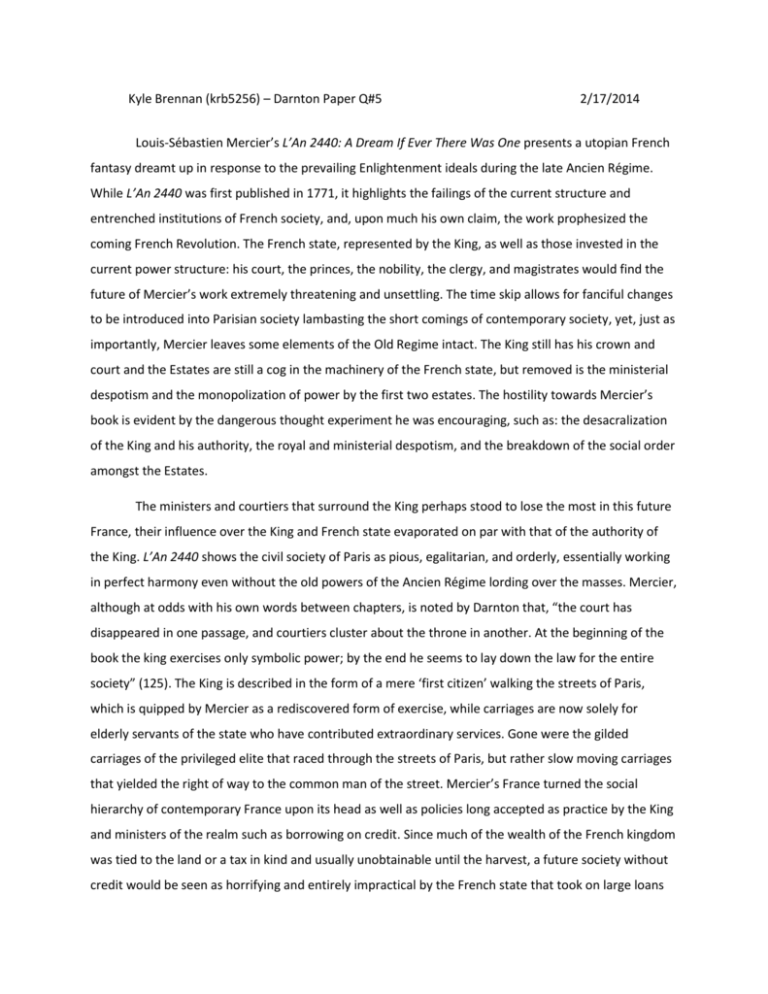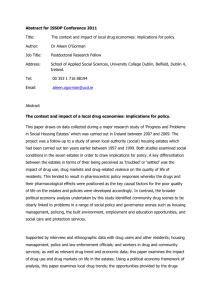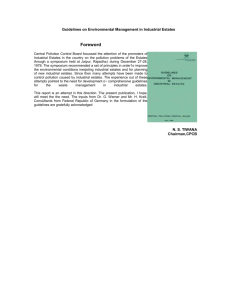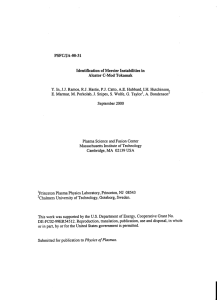Darnton: “The Forbidden Best-Sellers of Pre
advertisement

Kyle Brennan (krb5256) – Darnton Paper Q#5 2/17/2014 Louis-Sébastien Mercier’s L’An 2440: A Dream If Ever There Was One presents a utopian French fantasy dreamt up in response to the prevailing Enlightenment ideals during the late Ancien Régime. While L’An 2440 was first published in 1771, it highlights the failings of the current structure and entrenched institutions of French society, and, upon much his own claim, the work prophesized the coming French Revolution. The French state, represented by the King, as well as those invested in the current power structure: his court, the princes, the nobility, the clergy, and magistrates would find the future of Mercier’s work extremely threatening and unsettling. The time skip allows for fanciful changes to be introduced into Parisian society lambasting the short comings of contemporary society, yet, just as importantly, Mercier leaves some elements of the Old Regime intact. The King still has his crown and court and the Estates are still a cog in the machinery of the French state, but removed is the ministerial despotism and the monopolization of power by the first two estates. The hostility towards Mercier’s book is evident by the dangerous thought experiment he was encouraging, such as: the desacralization of the King and his authority, the royal and ministerial despotism, and the breakdown of the social order amongst the Estates. The ministers and courtiers that surround the King perhaps stood to lose the most in this future France, their influence over the King and French state evaporated on par with that of the authority of the King. L’An 2440 shows the civil society of Paris as pious, egalitarian, and orderly, essentially working in perfect harmony even without the old powers of the Ancien Régime lording over the masses. Mercier, although at odds with his own words between chapters, is noted by Darnton that, “the court has disappeared in one passage, and courtiers cluster about the throne in another. At the beginning of the book the king exercises only symbolic power; by the end he seems to lay down the law for the entire society” (125). The King is described in the form of a mere ‘first citizen’ walking the streets of Paris, which is quipped by Mercier as a rediscovered form of exercise, while carriages are now solely for elderly servants of the state who have contributed extraordinary services. Gone were the gilded carriages of the privileged elite that raced through the streets of Paris, but rather slow moving carriages that yielded the right of way to the common man of the street. Mercier’s France turned the social hierarchy of contemporary France upon its head as well as policies long accepted as practice by the King and ministers of the realm such as borrowing on credit. Since much of the wealth of the French kingdom was tied to the land or a tax in kind and usually unobtainable until the harvest, a future society without credit would be seen as horrifying and entirely impractical by the French state that took on large loans to offset budgetary deficits and fund wars. Aside from the insults of and challenges to the Kings authority clear throughout the book, another dangerous idea Mercier uses as the basis of his futuristic France is following “Rousseau’s reasoning exactly: law is ‘the expression of the General Will’” (130). Only five years prior in 1766, Louis XV gave the Parlements of Paris the famous séance de la flagellation reprimanding them: “my courts derive their existence and their authority from me alone; […] that to me alone belongs legislative power without subordination and undivided” (Baker, 49). The spread of Enlightenment ideals during latter half of the 18th century meant that what was an absolute monarchy of Louis XIV began to be seen as a despotic regime under Louis XV. Yet, the King is not solely responsible for what was seen as despotism, Darnton distinguishes its arbitrary rule from that of a tyrant because “despotism indicated that it pervaded an entire system of government” (213). The Parlements of Paris were suppressed by chancellor Maupeou in 1771 throwing France into a constitutional crisis. This alone serves as a prime example of ministerial despotism and by occurring during the release of L’An 2440 only helped reinforce passages such as: “Oh cruel magistrates! Men of iron, men unworthy of the name of man, you outrage humanity more than they [the imprisoned criminals] have outraged it themselves! Never has the ferocity of the brigands equaled yours” (123). While the constitutional crisis would end in 1774 upon the death of Louis XV and the ascension of his grandson Louis XVI, calls for reform and meeting of the Estates-General were seen as the only way to rectify the abuses suffered by the French people under the despotism of the privileged estates and magistrates. Mercier guides his readers through a French society where the distinction between the Estates has all but broken down entirely. The princes, while still extremely affluent, are innkeepers who show hospitality of a warm meal to needy guests and traveling foreigners alike. This contrasts the lavish displays of wealth and wasteful dinning of the societal elites in Mercier’s contemporary France. The nobility of France would be horrified to have the poor come into their estates to dine together let alone consent to the amalgamation of the Estates-General into the National Assembly. L’An 2440 continuously uses its future setting as a means to demonstrate the faults of the Old Regime. “Today, the reins of government are confided to wise and firm hands who follow a plan. The laws govern, and no one is above them – which was a dreadful stumbling block in your Gothic governments” (332). Mercier combines a subtle attack on the arbitrary nature of applying the law upon influential persons and the incompetence of the French bureaucracy. The meritocratic society that Mercier’s Paris exemplifies is evident in the means by which great citizens are honored and rewarded, “anyone who wears one of these honorable hats can pass anywhere; he would have free access anytime to the foot of the throne” (309). In the extremely stratified society outside of this dreamscape the nobility and courtiers among the King’s court would hardly allow a usurper such as one from the book to enter and have audience with the King, let alone free access at any time. This shows the monopolization of the King’s time and attention held by the influential insiders as well as the power struggles and intrigues of court. Mercier’s L’An 2440 can be seen as highlighting the hopes and dreams that began to take hold with the proliferation of Enlightenment ideals among the educated members of French society. It also can be seen as a condemnation of the wrongs committed by the despotic government of the Ancien Régime along with ways to correct these erroneous ways, albeit radical. The French state viewed this piece of literature as highly dangerous because of the many prevailing themes that run throughout it, from attacks on the sacredness of the King, to the despotic and corrupt system of governance, to the elimination of the different Estates allowing for educational and societal advancements.








